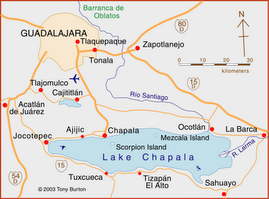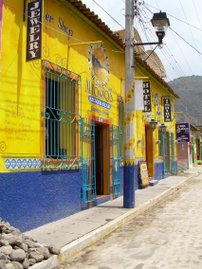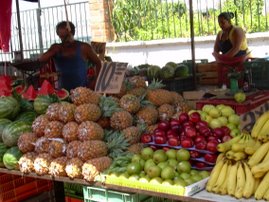
In the last post I discussed some challenging aspects of being foreign nationals living in another country. There were a few additional areas I didn't get to that I'd like to discuss in this post.
One of the most difficult things for Americans in particular, who are used to a huge selection of consumer items available throughout the United States, is the limited availability of products in Mexico. In the US, we would take a run to Wal Mart or TJ Maxx or Target, etc. to pick up something we were looking for. We could usually find the item in a variety of colors, sizes, calories, or whatever. Not so here. Here are some examples. As we age, we pay more attention to what we eat. In the US we would try to purchase food items that were healthy and environmentally friendly. We can buy tons of good produce here, for a reasonable price, which is great. But, most of the produce grown in Mexico is grown using pesticides and chemical fertilizer. So, if you like organic produce, it's difficult to find. Even if you find it in a store, you don't really know what the laws are governing "organic" labeling. This isn't usually a problem because we are hard-pressed to find any organic produce at all! There is an organic farm, run primarily by gringos, in San Juan Cosala, but their selection is limited and the prices are high.
For expats who are used to having their favorite American or Canadian products available, there is a store which imports many products from the US. Any food items which are imported from the US have a heavy duty slapped in them by Mexico (so much for NAFTA??!!). So, if you want a jar of mango chutney ($8.00), General Mills Cheerios ($11.00), or Nabisco ginger snaps ($7.50), etc, these items are available. The more economical way is to buy Mexican products at a fraction of the price. It amazes me to see Americans buying "American" Oreos for $8.50 a box when, directly across the aisle, you can buy virtually identical "Mexican-made" Oreos for $2.00.
Many Mexican items, like Campbell's soup, are not available in the same flavors as in the US. Tomato soup, for example, is cream of tomato. Popular flavors are poblano chile, cream of corn, and cream of asparagus. Most soups are cream based. You can, of course, buy American brands, for a hefty price. Those of us used to buying "light" or "diet" products are out of luck. The only diet soda is Coke Light (Diet Coke in the US). For salad dressing you have a choice of thousand island, Italian, caesar, or ranch, none light.
Another example, we thought we could go to a department store to buy a new meat thermometer. Think again. Mexicans traditionally cook their meals on top of the stove and don't roast meats as we do, so meat thermometers are rare here. Other items that are difficult to find here are washcloths, good-quality bed linens and towels, good British-style black tea, and, of course, English books and magazines.
So, what do we do? We learn to live like the rest of the world and do without some of these products, pick them up in the US, or pay through the nose for American products. We helped solve the book problem by buying ourselves an Amazon Kindle for Christmas.
A rather annoying, but insoluble problem living here is the vast amount of bureaucracy. Getting our annual visa renewal involves going to Chapala three separate times to process the visa application. The same with IMSS medical insurance (which we no longer carry). The deed for our house was so delayed (almost a year) that we thought it had gotten lost. Nope, just delayed in the legal bureaucracy of Mexico. It seems that whenever you have something to do involving Mexican bureaucracy, like paying traffic tickets, a water bill, or property taxes, it requires more time waiting around than would seem reasonable in the US. And if you want something done in your neighborhood, like upgrade of the road or the water system, street lights, etc. you are basically at the mercy of a bureaucratic system that is difficult to access because of the language barrier, and excruciatingly slow and inefficient. Things that we'd simply not tolerate in the US, we have no choice but to tolerate here. We get good at adapting and waiting. This, of course, is probably good for us in that it teaches us to be patient and urges us to find satisfaction outside of material opulence.
Perhaps the biggest issue that worries foreigners about Mexico is the violence. As I have written before, most crimes here involve burglary and theft, and are not violent. However, the drug cartels are extremely violent. Fortunately, for us, most of this crime is concentrated at the border with the US, and most of the victims are other drug gangs, police, judges, and occasionally journalists. Foreigners have not been targeted for violence. This last week, however, the deputy police chief in Chapala was approached by three gunmen in the middle of the day, on the main street, and assassinated. This is unprecedented in the Lake Chapala area. We do not know why he was targeted, but the most obvious reason might be that he busted a drug cartel, for this was clearly a revenge killing. I think most of us expats still feel very safe here, but we are all hoping that this does not indicate that this type of drug activity is moving into this area. Nevertheless, Mexico, as the US State Department has outlined on their travel advisories, is subject to random drug violence, but hardly ever in this area. Of course, anyone who lives in a large American city is used to many random violent acts every year. So the violence here has to be kept in perspective. In fact, according to Geo-Mexico, Mexico's crime rate per 1000 people is eighth in the world, behind, in order, the UK, US, South Africa, Canada, South Korea, Russia and Japan. Wikipedia reports that Mexico's homicide rate is 22nd in the world, behind such countries as Venezuela, Guatamala, Columbia, Brazil and Puerto Rico. In contrast, the US is 48th, China is 76th, The UK 84th, and Canada 90th.
Anyone who decides to live in a foreign country needs to be able to adapt to customs and policies which are different and may seem unreasonable to those of us who have lived in the United States. It's funny, whenever I return to the US, everything seems so organized and clearly marked. I suppose I have adapted to the culture and traditions of Mexican society. Many people arrive here, I think, expecting paradise. Weather wise, it certainly is. But to be happy here, you need to adjust your attitudes and expectations. Those who are unable to do this, end up going back to the US or Canada.
I am happy to report that those gringos who I reported had been arrested in my last post were released the next day after they were able to contact Mexican attorneys. And, as it turns out, I erroneously reported that they were arrested not knowing who was arresting them. Apparently, the arresting officers did present identification. Better ending.



































































1 comment:
Adjusting to different situations may be difficult at first, but once you get accustomed to the culture of the place you're living in, things will get better. Things like local delicacies and traditions might be a puzzle for anyone just settling in, but courage and curiosity will help you go a long way.
Rachal Dworkin @ Best Law Associates
Post a Comment